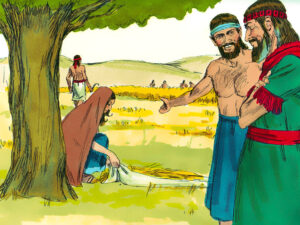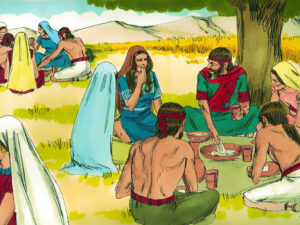By Cheryl Mah
Read: Ruth Chapter 2 & Watch: “Pass It On” sermon
Ruth Chapter 2 brings about a special union. The chapter begins with the introduction to a man named Boaz who was a relative of Naomi’s late husband Elimelech; he was also a man of God and a man of great wealth. In this story, Ruth is led by God to glean in Boaz’s field, and God’s providence and grace is seen through the kindness of Boaz.
Ruth meets Boaz
Ruth, as you may recall, is a Moabite woman who, after being widowed, remained with her mother-in-law Naomi and returned to Bethlehem with her.

Ruth asked for Naomi’s permission to go to a field to glean, While she was working in the field, she met Boaz who was the owner of the field. Although she did not need to, Ruth humbly asked Boaz for permission to glean in his field. Boaz gave her favourable treatment, and Ruth gleaned in the field until evening when she returned home.
When Ruth told Naomi where she had gleaned and that she had met Boaz, Naomi told Ruth that Boaz was their guardian-redeemer (a close, influential relative to whom members of the extended family could turn to for help).
In this chapter, how did Naomi and Boaz display grace and kindness?
1.Boaz’s greeting with his employees
When Boaz returned from Bethlehem and went to his field, he greeted his harvesters “The Lord be with you!” (Ruth 2:4). Through his interactions with his employees where the name of God was used in the greeting exchanges, we can see that Boaz ran his establishment for the Lord.
In his workers’ reply to him “The Lord bless you!”, it is obvious that his workers loved him and had a good relationship with him. This shows us something of the heart and character of Boaz.
2.Ruth asked for permission to glean
In His mercy to the foreigners, widows and the poor, God instituted laws that governed the harvesting of produce, so that nobody went hungry. Leviticus 19:9-10 clearly states this law from God: “When you reap the harvest of your land, do not reap to the very edges of your field or gather the gleanings of your harvest. Do not go over your vineyard a second time or pick up the grapes that have fallen. Leave them for the poor and the foreigner. I am the Lord your God.”
Under God’s law, Ruth had every right to glean in the fields and she happened to do so in the field belonging to Boaz. However, instead of enforcing her rights she gracefully asked the overseer of the harvesters, “Please let me glean and gather among the sheaves behind the harvesters.” (Ruth 2:7)
Gleaning is the gathering of grain or other harvested material left behind by reapers. In the Bible, the Israelites were commanded to allow the poor to follow behind reapers and pick up leftover spears of grain and fallen grapes. In this way, the Law provided food for the poor, orphans, widows, and even foreigners. The law specified that landowners must leave some of the harvest for gleaners. Because of this, Ruth did not actually have to ask for permission to glean in Boaz’s field.
3.Boaz’s kindness & provision to Ruth

Boaz showed favourable treatment to Ruth by providing the field for her to glean in and to remain there. He asked her to stay by his female workers (Ruth 2:8) so that they would take care of her and promised her protection from harm. He also provided water for her to drink. Through this, Ruth found companionship among the female workers, protection against the men, and refreshment when she was thirsty (Ruth 2:9).
By his actions, Boaz went beyond the law and the call of duty to show compassion for Ruth at a cost to himself.
4.Ruth’s grateful attitude
Acutely aware of her status as a foreigner, Ruth was shocked that Boaz would show her such favour and kindness (Ruth 2:10). She knew that based on nationality, she didn’t belong, and she felt lowly in status – even lowlier than the status of his servants (Ruth 2:13). This made Boaz’s kindness to her very precious. Instead of asking why her life was difficult, she asked why this good thing has come to her.
5.Boaz’s continued favour
Notwithstanding his earlier act of graciousness, Boaz continued to go out of his way to show kindness to Ruth. He not only invited her for the meal; he also invited her to share fully in the meal i.e. the privileged dipping of her bread in vinegar (Ruth 2:14) and offered her roasted grain.
When Ruth got up to continue gleaning, Boaz offered to let Ruth pick from the already gathered sheaves of grain. Boaz had wanted to bless Ruth with more grain, but he did not want to dishonour her by making her feel like a charity case, hence Boaz also ordered his men to pull out some stalks from the bundles and allow some grain to fall on purpose – so that Ruth can pick them up.
Many of us think of kindness in an abstract manner and in the general sense of being nice to people. However, Boaz teaches us that the thought of kindness manifests itself in practical acts and deeds. Kindness is about being proactive – not reactive or passive – and it can mean surpassing the expectations of the law or being selfless with no bounds.
———————————————————————————————————————
Reflection Questions:
1. What was Boaz’s intention in showing favour to Ruth?
2. Why did Ruth hope to continue finding favour in Boaz’s eyes (Ruth 2:13)?
3. What does “kindness” mean to you? How can you proactively apply kindness in your daily life?